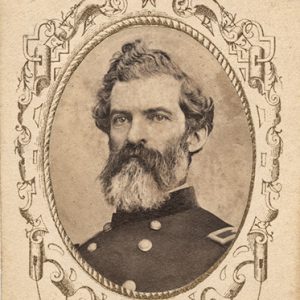calsfoundation@cals.org
John Wilson Sprague (1817–1893)
John Wilson Sprague was a general in the Union army during the Civil War and served as the assistant commissioner of the Freedmen’s Bureau in the District of Arkansas immediately following the end of the conflict.
John W. Sprague was born on April 4, 1817, in White Creek, New York, to Otis and Polly Sprague; he had several siblings. He attended local schools and, at the age of thirteen, began attending the Rensselaer Polytechnic Institute. Sprague left the college without receiving a degree and worked in the grocery business in Troy, New York, before moving to Ohio in 1845. Living in several towns over the course of his time in Erie County, Sprague worked in the shipping industry and served one term as county treasurer.
At the outbreak of the Civil War in 1861, Sprague organized a company and was selected as the captain. The company was reorganized when it joined the Seventh Ohio Infantry in May, and Sprague remained the captain. Moving with the regiment into western Virginia, Sprague and several comrades were captured on August 11 while returning home on leave. After spending time in both Richmond, Virginia, and Charleston, South Carolina, he was exchanged at Norfolk, Virginia, in January 1862. Before Sprague could return to his regiment, he received word that he had been given command of the Sixty-Third Ohio Infantry and promoted to colonel. The regiment saw action in Missouri before moving to Mississippi, where Sprague led the unit at the Battles of Iuka and Corinth. The unit served in northern Mississippi and Alabama, protecting rail lines.
In early 1864, Sprague took command of a brigade that joined operations against Atlanta, Georgia. Sprague led his brigade in the defense of a wagon train near Decatur, Georgia, on July 22, 1864. He was promoted to brigadier general eight days later. After the fall of Atlanta, he briefly commanded a division and led a brigade on the march through Georgia and the Carolinas.
At the end of the war, he led his brigade to Washington DC, where it participated in the Grand Review, and he received a brevet promotion to major general to rank from March 13, 1865. His next assignment was as the assistant commissioner for the Bureau of Refugees, Freedmen, and Abandoned Lands, and he was posted to St. Louis, Missouri. Sprague was tasked with commanding a district that included Missouri, Kansas, and the Indian Territory. In September 1865, Sprague moved his office to Little Rock (Pulaski County) and took command of the operations of the bureau in the state.
After arriving in the state, Sprague inspected the efforts undertaken by the bureau in Helena (Phillips County) and DeValls Bluff (Prairie County). He also began to assign officers to lead the bureau’s efforts across the state, and by the end of the year, thirty-five officers were stationed in twenty-four counties. While in the state, Sprague pushed a plan to lease small plots of land to freedmen, which would allow them to become more self-sufficient and not rely on support from the bureau. He also pushed efforts to increase funding for schools that served freedmen and called on private citizens to donate funds to support the effort. While Sprague made efforts to ensure that the freedmen in the state were treated fairly, he also believed that laborers had an obligation to fulfill their contracts with their employers. These contracts were supervised by local agents in the field who ensured that both parties met the obligations laid out in the document.
Sprague ended his service with the bureau in October 1866. He declined a permanent post with the rank of lieutenant colonel in the regular army and returned to civilian life. He worked on the Winona and Saint Paul Railway in Minnesota and, in 1870, became the manager of the western division of the Northern Pacific Railway. Moving to Tacoma, Washington, he retired from the railroad in 1883.
Sprague married for the first time shortly after he moved to Ohio. His wife, Lucy Wright Sprague, died in childbirth, although the child survived. He later married Julia Choate, and the couple had four sons. Upon his wife’s death, Sprague married her sister.
Sprague died in Tacoma on December 24, 1893, and is buried in the Tacoma Cemetery. In January 1894, Sprague was posthumously awarded the Medal of Honor for his actions at Decatur during the Civil War.
For additional information:
Finley, Randy. From Slavery to Uncertain Freedom: The Freedmen’s Bureau in Arkansas, 1865–1869. Fayetteville: University of Arkansas Press, 1996.
Moneyhon, Carl. The Impact of the Civil War and Reconstruction on Arkansas: Persistence in the Midst of Ruin. Baton Rouge: Louisiana State University Press, 1994.
Warner, Ezra. Generals in Blue: Lives of Union Commanders. Baton Rouge: Louisiana State University Press, 1964.
David Sesser
Henderson State University
 Civil War through Reconstruction, 1861 through 1874
Civil War through Reconstruction, 1861 through 1874 Military
Military John W. Sprague
John W. Sprague 




Comments
No comments on this entry yet.